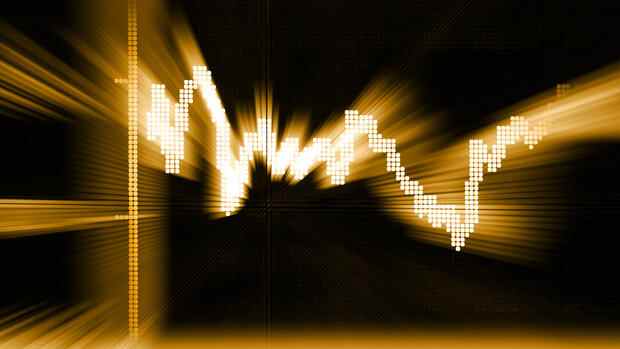Frankfurt A friendly mood prevailed among German stocks on Tuesday afternoon. At around 13,021 points, the Dax is around 0.5 percent higher than the previous day. The index had already gained 3.5 percent in the previous two trading days.
Dax winners are the Eon and RWE suppliers with 2.6 percent and 2.5 percent price increases. The background is the French state’s takeover bid for the domestic utility EDF, which gave the share price a jump of 15 percent in Paris.
However, the somewhat weaker prices in China and Apple’s plans for a more cautious hiring policy will initially have a negative impact on the overall market on Tuesday. This is fueling well-known concerns that the central bank’s tighter policy to combat inflation could lead to an economic downturn.
At the same time, however, there are signals that the European Central Bank (ECB) could raise interest rates more than expected at its meeting next Thursday. The news agencies Reuters and Bloomberg, citing insiders, report that an increase of 50 basis points is also possible. So far, an increase of 25 basis points was considered agreed.
Top jobs of the day
Find the best jobs now and
be notified by email.
That pushed the two-year German bond yield, which responds to near-term interest rate expectations, to its highest level in over two weeks. The euro rallied as high as $1.0253 after last week falling below par for the first time since 2002.
In their Tuesday assessment of the situation, the analysts at Metzler Capital Markets risked a positive outlook for the market as a whole. At the beginning of the week, investors were probably confident that the worst was behind them.
New monetary policy stimulus from China, short-term hopes for more oil from Saudi Arabia and speculation about central banks that are no longer quite as aggressive would have caused risky assets to rise. “Should the US reporting season also give its blessing, nothing stands in the way of a small summer rally,” according to the Metzler experts.
They also draw their confidence from the different behavior of institutional and private investors in Germany. As was the case in March 2020, the pandemic stock market crash, institutional investors would be significantly more confident, while private individuals would remain cautious. “A positive signal, because the professionals are often much more accurate with their assessment of the situation,” say the Metzler experts. After the crash in March 2020, prices quickly rose again.
Bernd Meyer, on the other hand, is rather skeptical about the situation. According to the chief investment strategist for asset management at Berenberg, analysts are still a long way from factoring a significant economic slowdown into their earnings estimates. “With the reporting season now underway for the second quarter, however, there should be more significant downward adjustments,” predicts the expert.
Eduard Baitinger, Head of Asset Structuring at the Feri Group, is much clearer. He expects a recession because the global economy has already been slowed down noticeably by tightening monetary policy. The inflation forecasts did not allow for an easing of these. “In this scenario, a timely turnaround on the markets is unlikely, and at least one further wave of sell-offs is to be expected,” believes the Feri man.
In an emergency, there would even be a risk of a severe global recession caused by severe economic imbalances. The trigger could be the global indebtedness of companies or states, perhaps also the bloated Chinese real estate market. “In this scenario, the negative trend on the stock markets would last at least until the end of the year,” says Baitinger.
The experts at the Italian asset manager Plenisfer Investments think similarly. Controlling inflation is difficult for central banks. In case of doubt, “the US Federal Reserve will give priority to fighting inflation over defending the financial markets,” it says. In plain language, this means that the central bank will pay little heed to Wall Street. And the European stock markets are also burdened.
Look at oil prices
The strategists at the Californian hedge fund Clocktower are venturing a completely different and positive mind game. The experts are starting with the most important energy commodity: “The geopolitical risk premium in the oil price could disappear quickly if Russia declares its mission in the Donbass to be complete and the war in the east stops.” The US Federal Reserve could then abandon its aggressive tightening of monetary policy.
An economic slowdown and a stabilization of energy prices are already underway. Inflation has peaked. Together with a then less aggressive central bank policy, the result would be clear: “This is bullish for risky assets.” In the process, the Clocktower experts expect an end to the dollar bull market and a strengthening euro.
Some analysts are also expecting inflation to flatten out because of the partly collapsing commodity prices. Robert Rethfeld from Wellenreiter Invest points out that iron ore currently costs less than half as much as it did at its peak a little over a year ago. The prices for shipping goods such as iron ore, coal or wheat were about three times the high of a year ago.
Look at individual values
Fraport: Investors regain more confidence in the airport operator. In the afternoon, the share advanced to the MDax winner with a plus of 4.2 percent.
Deutsche Bank: According to traders, the above-mentioned speculation about a more significant rate hike by the ECB on Thursday is the reason for the price gains in bank shares. The course of the Deutsche Bank gains 1.6 percent, that of the Commerzbank 3.4 percent. Bank stocks were already among the strongest the day before.
UnitedInternet: The share price of the Internet service provider falls by around one percent. According to traders, the background is the downgrade by Oddo BHF.
Here you can go to the page with the Dax course, here you can find the current tops & flops in the Dax.
